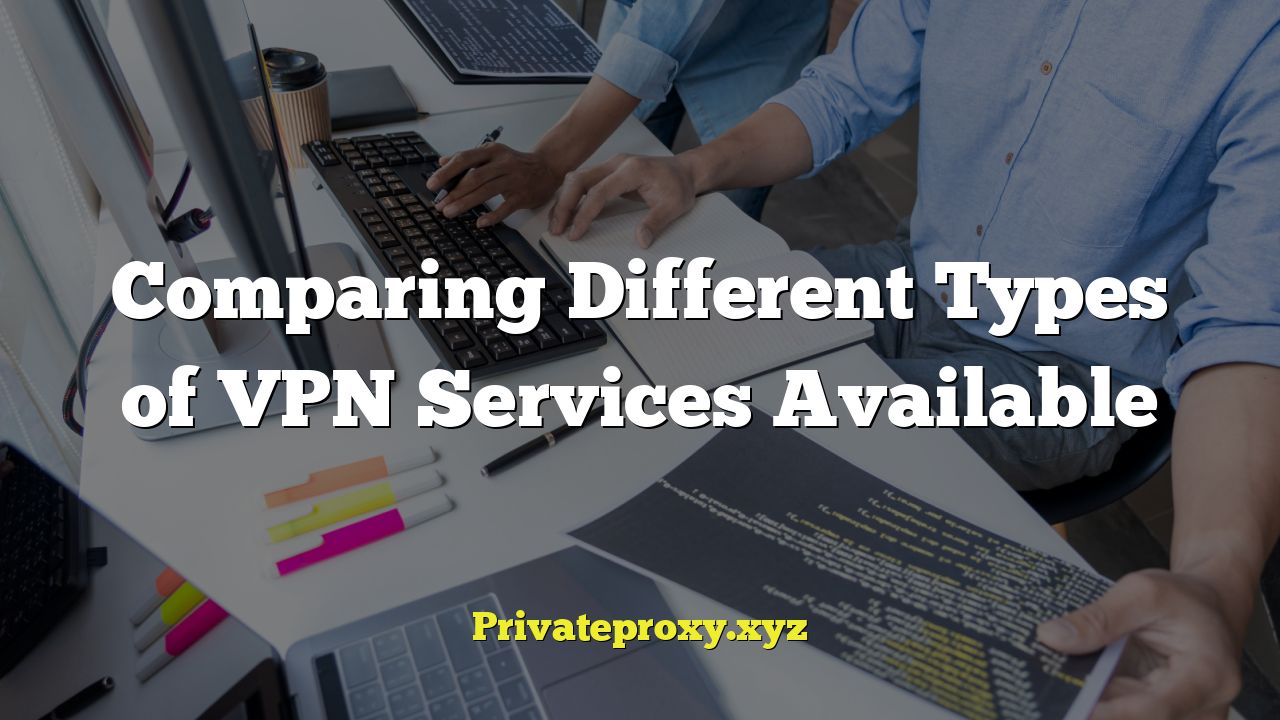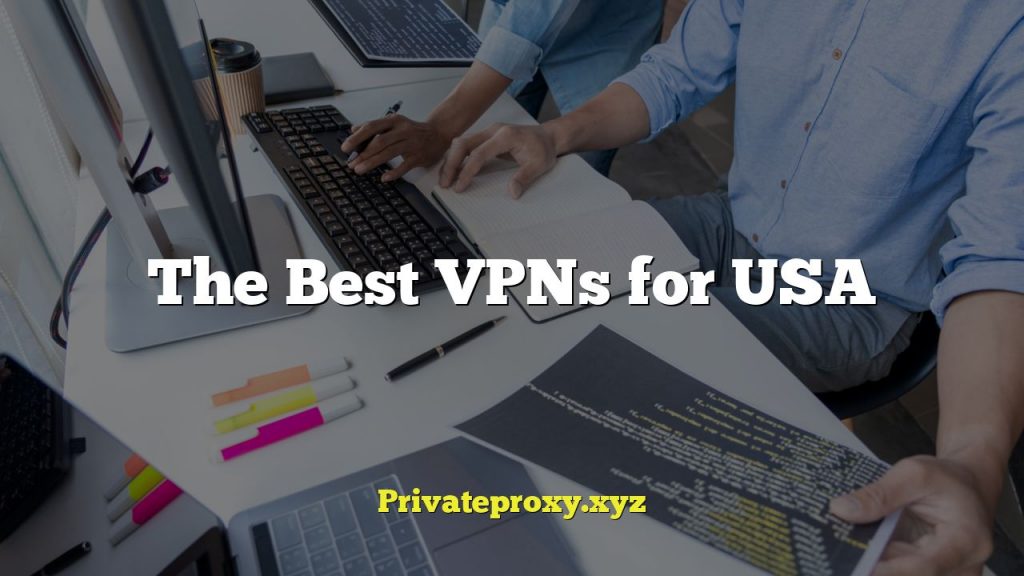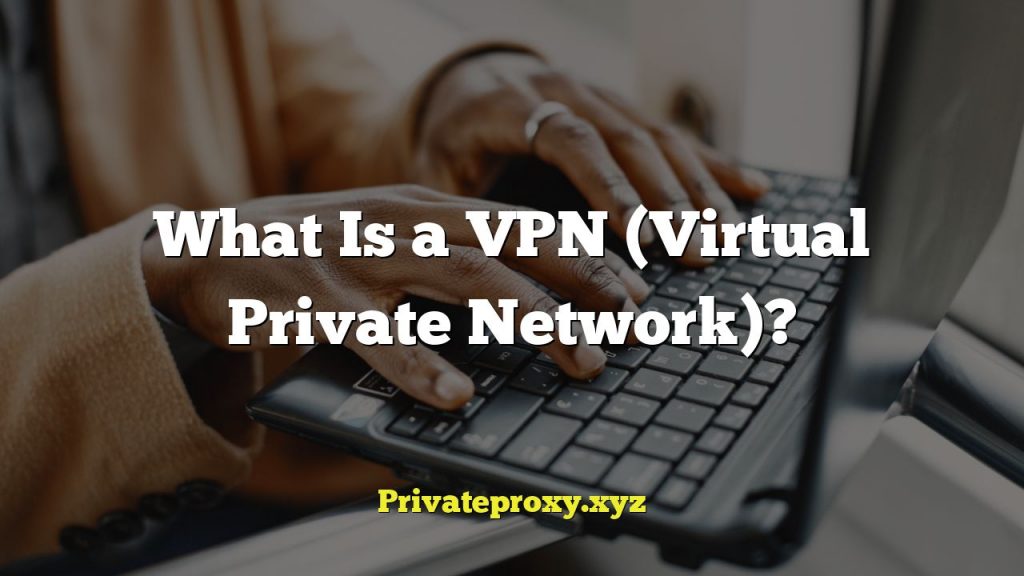
Understanding VPN Services
A Virtual Private Network (VPN) is a technology that creates a secure and encrypted connection over a less secure network, like the internet. It essentially tunnels your internet traffic through a server controlled by the VPN provider, masking your IP address and encrypting your data. This offers numerous benefits including:
- Enhanced online privacy.
- Increased security on public Wi-Fi networks.
- Access to geographically restricted content.
- Circumventing censorship.
Choosing the right VPN, however, can be overwhelming. Numerous types exist, each with its own strengths and weaknesses. This article will delve into the various types of VPN services available, helping you make an informed decision based on your individual needs.
Types of VPN Services Based on Protocol
The VPN protocol dictates how your data is encrypted and transmitted between your device and the VPN server. Different protocols offer varying levels of security, speed, and reliability. Understanding these protocols is crucial for selecting the right VPN.
OpenVPN
OpenVPN is widely regarded as one of the most secure and versatile VPN protocols. It is an open-source protocol, meaning its code is publicly available for scrutiny, reducing the risk of backdoors or vulnerabilities.
- Security: Employs strong encryption algorithms like AES and Blowfish.
- Flexibility: Can be configured to use either TCP (Transmission Control Protocol) or UDP (User Datagram Protocol).
- Platform Compatibility: Compatible with most operating systems and devices.
- Open Source: The open-source nature allows for continuous auditing and improvement by the security community.
TCP provides reliable data transmission but can be slower due to error correction. UDP is faster but less reliable, suitable for streaming and gaming. OpenVPN’s versatility makes it a popular choice, but its configuration can sometimes be complex.
IKEv2/IPsec
Internet Key Exchange version 2 (IKEv2) works in conjunction with Internet Protocol Security (IPsec) to create a secure VPN tunnel. IKEv2/IPsec is known for its stability and speed, particularly on mobile devices.
- Speed and Stability: Quickly re-establishes connection after interruptions, ideal for mobile users.
- Security: Uses strong encryption protocols.
- Good for Mobile: Efficiently handles network changes.
- Complexity: Can be more difficult to configure manually compared to OpenVPN.
IKEv2/IPsec is a good choice for users who prioritize a stable and fast connection, especially on mobile devices, but its configuration might require some technical expertise.
WireGuard
WireGuard is a relatively new VPN protocol designed for speed and simplicity. It boasts a lean codebase, making it easier to audit and less prone to vulnerabilities.
- Speed: Offers significantly faster speeds compared to OpenVPN and IKEv2/IPsec.
- Security: Employs modern cryptographic techniques.
- Simplicity: Easier to configure than OpenVPN.
- Relatively New: As a newer protocol, it hasn’t been as extensively tested as OpenVPN.
WireGuard is gaining popularity due to its impressive speed and security, but because it’s newer, long-term reliability and security are still being evaluated.
L2TP/IPsec
Layer 2 Tunneling Protocol (L2TP) is often used in conjunction with IPsec to provide encryption and security. However, L2TP itself doesn’t provide encryption; it relies on IPsec for that.
- Security: Relies on IPsec for encryption.
- Relatively Easy to Configure: Simpler to set up than OpenVPN.
- Slower Speeds: Generally slower than OpenVPN and IKEv2/IPsec.
- Potential Security Concerns: Some concerns have been raised regarding its security, although generally considered safe when properly implemented with IPsec.
L2TP/IPsec is a decent option if ease of configuration is a priority, but it’s generally less preferred than OpenVPN, IKEv2/IPsec, or WireGuard due to potential security concerns and slower speeds.
PPTP
Point-to-Point Tunneling Protocol (PPTP) is one of the oldest VPN protocols and is now considered obsolete due to its significant security vulnerabilities.
- Speed: Was once known for its speed, but modern protocols are much faster.
- Easy to Configure: Simple to set up.
- Security Concerns: Highly vulnerable to security exploits; not recommended for use.
- Limited Encryption: Uses weak encryption that can be easily cracked.
PPTP should be avoided due to its serious security flaws. Modern protocols offer superior security and speed.
Types of VPN Services Based on Deployment
VPN services can also be categorized based on how they are deployed and managed.
Commercial VPN Services
Commercial VPN services are offered by companies that provide VPN access to individuals and businesses for a fee.
- Ease of Use: Typically offer user-friendly apps and setup guides.
- Server Network: Provide a large network of servers in various locations.
- Customer Support: Offer customer support to assist with technical issues.
- Cost: Require a subscription fee.
- Privacy Policies: Privacy policies vary widely, so it’s crucial to choose a provider with a strong commitment to user privacy and a no-logs policy.
Examples include NordVPN, ExpressVPN, Surfshark, and CyberGhost. These services handle the technical aspects of VPN configuration, making them ideal for users who want a hassle-free experience. However, it’s essential to carefully evaluate their privacy policies and security practices.
Self-Hosted VPN
A self-hosted VPN involves setting up and managing your own VPN server, typically on a cloud platform or your own hardware.
- Control: You have complete control over your VPN server and data.
- Privacy: Greater privacy as you are not relying on a third-party provider.
- Cost: Can be cost-effective in the long run, depending on the hosting solution.
- Technical Expertise: Requires technical knowledge to set up and maintain.
- Responsibility: You are responsible for ensuring the security of your server.
This option is suitable for technically proficient users who want maximum control over their VPN setup. Popular solutions include setting up a VPN server on a Raspberry Pi or using cloud platforms like Amazon Web Services (AWS) or DigitalOcean.
Router-Based VPN
A router-based VPN involves configuring your router to act as a VPN client, encrypting all traffic that passes through your home network.
- Network-Wide Protection: Protects all devices connected to your network.
- Ease of Use: Once configured, it automatically protects all devices.
- Performance: Can impact network speed, especially on older routers.
- Router Compatibility: Requires a router that supports VPN client functionality.
- Setup Complexity: Can be more complex than setting up a VPN on individual devices.
This is a good option for protecting multiple devices simultaneously, especially devices that don’t natively support VPN software (like smart TVs or gaming consoles).
Browser-Based VPN
Browser-based VPNs, often offered as browser extensions, encrypt your traffic only within the browser.
- Convenience: Easy to install and use.
- Limited Protection: Only protects traffic within the browser; other applications remain unprotected.
- Security Concerns: Some browser extensions may have questionable security practices.
- Performance: Can sometimes slow down browsing speed.
Browser-based VPNs are suitable for occasional use or for protecting specific browsing activities, but they are not a comprehensive solution for full-system protection.
Types of VPN Services Based on Functionality
VPN services can also be classified based on their specific features and functionalities.
Personal VPN
Designed for individual users to protect their privacy, security, and access geo-restricted content.
- Privacy Protection: Masks your IP address and encrypts your internet traffic.
- Security: Protects your data on public Wi-Fi networks.
- Geo-Unblocking: Allows access to content restricted to specific regions.
- User-Friendly: Typically offers easy-to-use apps and interfaces.
This is the most common type of VPN, catering to the needs of everyday users who want to enhance their online security and privacy.
Business VPN
Used by businesses to connect remote employees to the company network securely, protect sensitive data, and provide secure access to internal resources.
- Secure Remote Access: Allows employees to access company resources from anywhere.
- Data Protection: Protects sensitive business data during transmission.
- Centralized Management: Allows IT administrators to manage VPN access and policies.
- Scalability: Can scale to accommodate a growing number of users.
Business VPNs are essential for companies with remote workforces or those handling sensitive data. They often include features like multi-factor authentication and centralized management tools.
Site-to-Site VPN
Connects two or more geographically separate networks, allowing them to communicate securely as if they were on the same local network.
- Network Connectivity: Connects multiple office locations.
- Secure Communication: Enables secure data transfer between networks.
- Cost-Effective: Can be more cost-effective than leasing dedicated lines.
- Complexity: Requires more complex configuration than personal or business VPNs.
Site-to-site VPNs are commonly used by organizations with multiple offices to create a unified and secure network infrastructure.
Key Considerations When Choosing a VPN Service
Selecting the right VPN service involves considering several factors to ensure it meets your specific needs and requirements.
Security
* Encryption Protocols: Prioritize VPNs that use strong encryption protocols like AES-256.
* No-Logs Policy: Choose a VPN with a strict no-logs policy to ensure your online activities are not recorded.
* Jurisdiction: Consider the VPN provider’s jurisdiction and data retention laws.
* Security Audits: Look for VPNs that have undergone independent security audits.
Speed and Performance
* Server Locations: Choose a VPN with servers located in regions close to your actual location for optimal speed.
* Protocol: Different protocols offer different speed characteristics; WireGuard generally offers the best speeds.
* Server Load: Check the server load to avoid congested servers that can slow down your connection.
Privacy
* No-Logs Policy: Verify the VPN provider’s no-logs policy and ensure it is clearly defined.
* Anonymity: Consider the level of anonymity provided by the VPN service.
* Payment Methods: Look for VPNs that accept anonymous payment methods like cryptocurrency.
Features
* Kill Switch: Ensures your internet connection is automatically disconnected if the VPN connection drops.
* Split Tunneling: Allows you to choose which apps use the VPN connection and which ones use your regular internet connection.
* Multi-Hop: Routes your traffic through multiple servers for increased security and anonymity.
* Dedicated IP Address: Provides a static IP address that is only used by you, reducing the risk of being blacklisted.
Cost
* Subscription Plans: Compare different subscription plans and pricing options.
* Free VPNs: Be cautious of free VPNs, as they may log your data or inject ads into your browsing sessions. They often have limited bandwidth and fewer server options.
* Trial Period: Look for VPNs that offer a free trial or money-back guarantee.
Customer Support
* Availability: Ensure the VPN provider offers reliable customer support.
* Responsiveness: Check the responsiveness of the customer support team.
* Support Channels: Look for multiple support channels, such as live chat, email, and a knowledge base.
By carefully considering these factors, you can choose a VPN service that effectively protects your privacy, security, and online freedom. Thorough research and understanding your specific needs are crucial for making the right decision.



